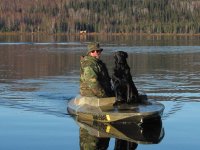yeah, thats what I meant. The downside of many dogs that are upland hunted early is a tendancey to go self employeed in cover and scent... a good thing when upland hunting, a bad thing when trying to trying to run a blind thru cover to a bird. if your expectations are to ever have a dog that will do advanced work, then your gonna be happier waiting to put a dog in that situation till after they have a solid understanding of the blind running game. Seen many a talented dog that pheasant hunted their first season, and years later they go self employeed on a blind in scent. Death to a test dog for sure, but also a lot of times a real problem in a real hunting situation. My training philisophy is its a lot better to control behavior than correct it, so I never allow anything I'll have to use pressure to fix later. Time spent fixing is time not being spent progressing. Id rather teach than correct anyday.
Never thought of waiting till a dog was 2 was a long time for anything, especially something he should be doing for the next 8 to 10 years really, really well. I wasnt saying dont hunt your dog the first season, but if you want a duck dog, with some birds on the side (like the orignal post was), personally Id put some experience on the dog before I let em upland hunt. The first season a dog hunts anything is gonna change his behaviors forever, I like it be something i control. Just like I wont let someone shoot a goose for a dog on its first few hunts until they get the cripple game down... or hunt a young dog in current... or for 7 or 8 guns... All of my dogs have hunted before they where 2, but I carefully controled their expereinces. Heck, da juice and nasty where 5 months old, didnt have a clue about watching the sky, but you could knock a duck down, and throw a rock for a splash and theyd go get them. Did they learn much? Naw, but they learned NOTHING determinetal to their eventual potiental.
Quatering cover is just a phrase for hunting the advabile cover for the gun back and forth. Its not a pattern. The type & thickness of cover only dictates how fast the dog can cover it. The side to side range will change in a sidewind, as the dogs learn how to use the wind.
My (duck) dogs stay in gun range and sit to flush and shot, my older dog understands the difference between a cripple he must chase down, and a bird I will shoot for him if he sits (even if it starts as one and becomes the other, way cool to see him chase a cripple back towards you and sit only if it flies toward you, but chase if it flies away). We started upland training simply for a game we play (the hrc grand last series is an upland test), as we dont have any quail left in this part of the country. But its such a useful skill on a duck hunt for cripples, I cant imagine having a dog that doesnt do it now. A lot of times we'll sail ducks over a 1/4 mile into wide open cut fields. Unless dead they will make it to the next advaible cover, which is the big grown up ditches that boarder the fields. Ride the dog on the 4 wheeler to the side of the ditch the wind is right for, and tell them to hunt em up... let them quater the ditch until they find the bird. Ease up the other side of the ditch as the dog works it, cause the bird will come out that side. Pretty cool to see your dog sit to flush on a wounded speck getting its second wind and flying off, dropping it on the rise, and your dog jumping back on the bike with it. travis (whose letters & ribbons are for the purpose of having better hunting dogs)

